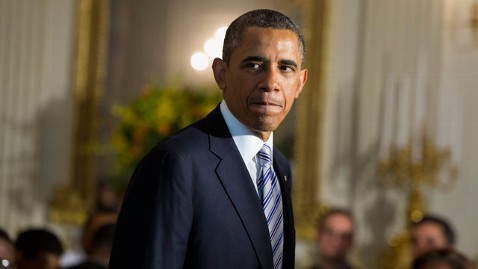President Obama: NSA Spying Programs 'Transparent'

(Evan Vucci/AP Photo)
President Obama said that two National Security Agency programs recently revealed through leaked secret documents were "transparent" and, in an interview with PBS's Charlie Rose on Sunday, he dismissed concerns that the programs were vulnerable to abuse by government officials.
"It is transparent," Obama said in the interview, broadcast Monday night.
"What I've asked the intelligence community to do is see how much of this we can declassify without further compromising the program, No. 1," Obama said. "And they are in that process of doing so now so that everything that I'm describing to you today, people, the public, newspapers, etc., can look at - because, frankly, if people are making judgments just based on these slides that have been leaked, they're not getting the complete story."
Obama said that he will meet with the Privacy and Civil Liberties Oversight Board, a five-member independent agency that advises the president and Congress on privacy and civil liberties concerns, to "structure a national conversation" about the programs. That meeting will take place in the coming days, according to an administration official, and will be part of a broader outreach to national security, civil liberties and technology stakeholders.
When asked whether he believed admitted NSA leaker Edward Snowden should be prosecuted, Obama declined to comment, but he said that the case has been referred to the Department of Justice for a criminal investigation and "possible extradition."
In response to criticism that he has adopted Bush administration policies wholesale, Obama dismissed a suggestion that as a U.S. senator he was opposed to intelligence gathering.
"Some people say, 'Well, you know, Obama was this raving liberal before. Now he's, you know, Dick Cheney,'" Obama said. "My concern has always been not that we shouldn't do intelligence gathering to prevent terrorism, but rather: Are we setting up a system of checks and balances?"
He offered a strenuous defense of the NSA programs, which he said guard the privacy of Americans through judicial and legislative review.
"What I can say unequivocally is that if you are a U.S. person, the NSA cannot listen to your telephone calls, and the NSA cannot target your emails … and have not," he said.
The first program, called the 2015 program, authorizes the government to collect telephone metadata about phone numbers and lengths of telephone calls.
"There are no names. There is no content in that database. All it is, is the number pairs, when those calls took place, how long they took place - so that database is sitting there," Obama said, adding that the FBI must seek legal authority through the Foreign Intelligence Surveillance Act court in order to search the database.
A second program used to gather information from Internet service providers, called the "702 program," cannot be used against a "U.S. person," Obama said.
"The one thing people should understand about all these programs, though, is they have disrupted plots, not just here in the United States but overseas, as well," Obama said
He referenced a foiled plot to blow up the New York subway system that he said may have been uncovered with the help of the programs.
"We're going to have to find ways where the public has an assurance that there are checks and balances in place, that they have enough information about how we operate that they know that their phone calls aren't being listened into; their text messages aren't being monitored, their emails are not being read by some big brother somewhere," Obama said. "They've got to feel that confidence and that it is not potentially subject to abuse, because there are sufficient checks and balances on it while still preserving our capacity to act against folks who are trying to do us harm."
Obama also declined to go into more detail about what additional assistance the U.S. government would provide to Syrian rebels after Syrian president Bashar al-Assad's regime was found to have crossed a "red line" by using chemical weapons against its people.
The president suggested that a no-fly zone would be ineffective.
"This argument that somehow, [if] we had gone in earlier or heavier, in some fashion, that the tragedy and chaos taking place in Syria wouldn't be taking place, I think is wrong," Obama said. "What I'm saying is that if you haven't been in the Situation Room poring through intelligence and meeting directly with our military folks and asking, 'What are all our options?' and examining what are all the consequences, and understanding that, for example, if you set up a no-fly zone that you may not be actually solving the problem on the zone."